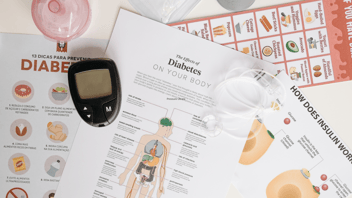Addison's Disease NCLEX Review for Nursing Students + Free Download

Understanding Addison’s Disease:
Rare but Significant Condition: Addison's disease, also known as primary adrenal insufficiency, is a relatively rare but potentially life-threatening condition. Nurses should be knowledgeable about its pathophysiology, clinical presentation, and management to provide effective care to patients with this disorder.
Hormonal Imbalance: Addison's disease results from the insufficient production of adrenal hormones, particularly cortisol and aldosterone. Nurses need to understand the role of these hormones in maintaining homeostasis and the consequences of their deficiency.
.png?width=1200&height=630&name=nclex%20review%20for%20angina%20(2).png)
Assessment Skills: Nurses should be skilled in recognizing the signs and symptoms of Addison's disease, which can include fatigue, weight loss, hypotension, electrolyte imbalances, and hyperpigmentation.
Emergency Management: Addisonian crisis, a severe form of adrenal insufficiency, can be life-threatening. Nurses should be knowledgeable about the signs of crisis, such as severe hypotension, shock, and altered mental status, and be prepared to provide emergent care.
Medication Management: Patients with Addison's disease require lifelong hormone replacement therapy with glucocorticoids (such as hydrocortisone) and mineralocorticoids (such as fludrocortisone). Nurses should understand dosing, administration, and potential side effects of these medications.
Fluid and Electrolyte Balance: Adequate understanding of the role of aldosterone in regulating sodium and potassium balance is crucial for nurses to identify and manage electrolyte imbalances that can occur in Addison's disease.
Patient Education: Nurses play a key role in educating patients with Addison's disease about their condition, medication management, stress management, and when to seek medical attention.
Documentation: Accurate documentation of signs, symptoms, medication administration, and patient education is essential for tracking the patient's condition and providing continuity of care.
NCLEX Preparation: The NCLEX exam may include questions related to Addison's disease, its pathophysiology, assessment, interventions, and patient education. A solid understanding of this topic is crucial for answering these questions accurately.
Overall, understanding Addison's disease equips nursing students to provide safe, patient-centered care to individuals affected by this hormonal disorder. It ensures that nursing students are prepared to address the unique challenges and needs of patients with Addison's disease throughout their healthcare journey.
Overview of Addison’s Disease
1. Hyposecretion of adrenal cortex hormones
2. Decreased levels of glucocorticoids and mineralocorticoids lead to electrolyte imbalances and decreased vascular volume
General Information for Addison’s Disease
1. Adrenal Cortex
a. Glucocorticoids (ie. cortisol) are in charge of glucose, fat metabolism, and anti-inflammatory
b. Mineralocorticoids (ie. aldosterone) whose deficiency leads to hyponatremia, hyperkalemia
c. Sex hormones (Androgens) i.e Testosterone, Estrogen which controls physical features and hair distribution
2. Adrenal Medulla
a. Epinephrine (Adrenaline), Norepinephrine (Noradrenaline), Fight or Flight Response
Nursing Assessment for Addison’s Disease
1. Cardiovascular
a. Hypotension, tachycardia
2. Metabolic
a. Weight loss
3. Integumentary
a. Hyperpigmentation (bronzing)
4. Electrolytes
a. Hyperkalemia, hypercalcemia, hyponatremia,
and hypoglycemia
5. Addisonian Crisis
a. Acute exacerbation
b. Severe electrolyte disturbance
Therapeutic Management for Addison’s Disease
1. Replace adrenal hormones
a. Corticosteroids→ Hydrocortisone, prednisone
2. Addisonian Crisis
a. Monitor electrolytes and cardiovascular status closely
b. Administer adrenal hormones as ordered
c. Administer electrolyte replacement as needed
.png?width=1200&height=630&name=nclex%20review%20for%20angina%20(2).png)
Nursing Case Study for Addison’s Disease
Patient Profile:
Sarah Miller, a 38-year-old woman, presents to the emergency department with complaints of extreme fatigue, weakness, and dizziness. She reports a history of worsening symptoms over the past few months, including weight loss, darkening of the skin, and salt cravings.
Assessment:
Upon assessment, Sarah appears fatigued and pale. She has hyperpigmentation on her face, especially around her lips and cheeks. Her blood pressure is low, and she is experiencing orthostatic hypotension. Laboratory tests reveal hyponatremia and hyperkalemia.
1. Stabilization:
- Collaborate with the healthcare provider to stabilize Sarah's condition by administering intravenous fluids to address hypotension and electrolyte imbalances.
- Collaborate with the healthcare provider to initiate hormone replacement therapy, including oral hydrocortisone to replace cortisol and oral fludrocortisone to replace aldosterone.
- Educate Sarah about the importance of adhering to her hormone replacement medication regimen and the necessity of regular follow-up appointments.
- Educate Sarah about the need to increase her hydrocortisone dose during times of stress, illness, or surgery.
- Monitor Sarah's fluid and electrolyte levels closely, particularly sodium and potassium levels, to prevent imbalances.
- Collaborate with a registered dietitian to develop a balanced diet that includes an appropriate sodium intake to maintain electrolyte balance.
- Offer emotional support to Sarah, addressing her concerns and providing resources for coping strategies.
- Educate Sarah about the potential side effects of hormone replacement medications and how to recognize signs of overmedication or under medication.
- Teach Sarah and her family about the signs of an Addisonian crisis (severe adrenal insufficiency) and the importance of seeking medical attention promptly.
- Schedule follow-up appointments to monitor Sarah's response to hormone replacement therapy, adjust medication doses as needed, and assess for any complications.
Outcome:
With comprehensive care and hormone replacement therapy, Sarah's condition improves. Her fatigue and dizziness gradually decrease, and her blood pressure stabilizes. Her electrolyte imbalances are managed effectively with proper medication and dietary management. She becomes educated about her condition and takes an active role in managing her health.
Free Download for Addison's Disease
Are you looking for more must-know NCLEX review topics? Download our free eBook "NCLEX Flash Notes" as a valuable resource for nursing students. Encourage readers to download their free copy of the "NCLEX Flash Notes."
.png?width=1200&height=630&name=nclex%20review%20for%20angina%20(2).png)
You CAN Do This
Happy Nursing!






%20nclex%20review%20nursing%20students.png?width=352&name=COPD%20(Chronic%20Obstructive%20Pulmonary%20Disease)%20nclex%20review%20nursing%20students.png)
